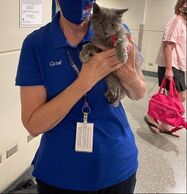NOTE: WE FEED ALL OUR CATS AND KITTENS HIGH PROTEIN GRAIN FREE ALL LIFE STAGES FOOD. IF YOU CHOOSE TO FEED SOMETHING ELSE AFTER ADOPTION IT IS YOUR RESPONSIBILITY TO PROPERLY TRANSITION THE CAT/KITTEN TO A NEW FOOD OVER A 12 DAY PERIOD. FAILURE TO DO SO CAN RESULT IN CHRONIC DIARRHEA AND THIS WILL BE THE RESPONSIBILITY OF THE ADOPTER TO SEEK VET CARE FOR.
MEOW STORIES FELINE VET POLICY
Spayed/Neutered: Your cat has already been spayed or neutered. Our companion animals currently face an overpopulation crisis. Each year, millions of healthy cats and dogs are euthanized because the shelters have no room and there are no homes for them. Therefore, every animal that is adopted out of our programs cannot further add to this sad and frustrating situation. Your contract will state if the animal was spayed/neutered prior to our receiving the cat or it will list the date our vet performed the operation.
Spay/neuter not only helps keep the shelters from euthanizing even more animals but has physical benefits as well. Females have a lower risk of ovarian, uterine and breast cancers and she will never develop pyometra, an infection of the uterus, which occurs often in older unspayed females. Males are less likely to develop prostate, perianal, and testicular tumors and cancers.
The behavior benefits are much more obvious. Females will not bleed from going into heat or “cry” for a mate. Males will be less aggressive, less likely to spray urine and get into fights with other cats over a mate. Many express concerns that spaying and neutering makes a pet fat, overeating and lack of exercise are the only things that can make a pet fat
Rabies Vaccine: All cats who are 3lbs or 4months old receive a rabies vaccination. You should receive a rabies tag and/or a certificate of vaccination. Please keep this certificate or tag for your records. The next rabies vaccination is due in 1 year. If you adopt a kitten under this age, the rabies vaccine becomes the responsibility of the adopter. This is a mandatory vaccination required by the State of Virginia at 4 months of age and every year or 3 years after that, please consult your vet as to the recommended vaccination schedule.
De-wormed: We use a broad-spectrum wormer (Strongid/Pyrantel). Since this is a broad-spectrum wormer it may not kill all intestinal worms your cat may have. This is one reason why the follow up vet visit is so important to your pet’s health.
Feline Leukemia: All cats test negative for Feline Leukemia at the time of their vet work unless otherwise noted through our special needs adoptions. They do NOT receive the feline leukemia vaccination as our adoption contract specifically states all of our cats and kittens are adopted as indoor only pets. Please consult your veterinarian for this series of vaccinations.
Feline AIDS: All cats test negative for FIV at the time of their vet work unless otherwise noted through our special needs adoptions. They do NOT receive the feline immune deficiency vaccination.
Feline Infectious Peritonitis (FIP): They do NOT receive the FIP vaccination. There is no combo test for FIP as there is for FeLV and FIV and no conclusive diagnostic test as FIP is the direct result of the mutation of another virus. This is a decision for the adopter and the vet to make after considering the pet’s lifestyle and knowing the pros and cons.
Microchips: Microchips are provided as a courtesy when donation funding is available to offset their cost. All registration fees for the microchips are the responsibility of the adopter. If a cat or kitten is returned after the microchip is registered, these costs will not be refunded.
Flea Control: All cats are administered Revolution, Advantage Multi or Bravecto. When you apply these to your pet, the active ingredient is stored in the natural oils of his/her skin and coat. This provides your pet with protection against fleas and ticks for a month as well as treating for earmites and has broad spectrum deworming properties. Please do not use flea collars or over the counter flea shampoo on your cat, this can cause much irritation and in extreme cases death with certain brands. Especially do not use over the counter products formulated for dogs! Talk to your vet about the best choice for you and your pet in flea and tick control.
Feline Distemper: FVRCP: Feline Viral Rhinotracheitis (FVR), Calicivirus (FCV), Panleukopenia (FVP). FVR and FCV are viral diseases of the eyes, nose and throat. FVP is a viral disease of the blood and intestines (feline distemper or infectious enteritis). We administer a minimum of 2x FVCRP on all cats and kittens under 1 year of age and a minimum of 1x FVCRP on cats over 1 year of age. Please discuss your adopted pet’s vaccination schedule with your vet.
Why should my cat still see a vet after all this vet work has been done?
First, it helps you establish a relationship with a vet. This is a wonderful forum for all your questions about your pet's needs. A vet is trained to help you keep your new pet healthy and happy.
Second, not all possible vet work has been given to your pet. The essential vaccinations have been given, but the ones that are non-essential have not. This gives you more control over your cat's future health. Please talk to your vet about the risks involved with the FeLV and FIP vaccinations before deciding if they are right for your cat. The broad-spectrum wormer may not have removed ALL parasites from your cat. The vet will determine if any are present, identify which one(s) and prescribe a more targeted drug. The Revolution flea control lasts optimally for one month. You may obtain more by visiting your vet. Even if you do not wish to continue using prescribed flea control, talk to your vet about what is safe for your cat. Not all over the counter flea products are safe and never use products intended for a dog on your cat/kitten.
What happens if my adopted pet becomes ill?
If your cat or kitten becomes ill during the first 14 days after adoption you can return the cat or kitten for a full refund. However, due to incubation periods for various illnesses we CANNOT give a medical guarantee. It is the adopter’s responsibility to seek medical attention for their adopted pet or return it.
FOOD
Please Note: Kittens under 4 months of age should be fed canned kitten food twice a day on top of normal dry kitten food, failure to do so could result in significant weight loss. Never feed a kitten adult cat food. Cats and kittens are lactose intolerant and should never be given any products containing cow’s milk.
Please inform yourself before feeding any human food to your cat or kitten, things like onion and garlic are toxic to cats and kittens, as well as many other human foods.
When adopting your new feline, you should purchase the food the PetSmart Store is feeding. If you decide not to use this food long term you will still need to purchase a small bag in order to transition your new pet to the one you plan on feeding long term.
A cat or kitten should be transitioned to a new food over a 12-day period. The first 4 days you should mix the food 75% old and 25% new, the next 4 days should be a 50/50 mix, and the final 4 days should be 25% old and 75% new. On day 13 you can switch your new pet over completely to your new food. Failure to transition your new pet properly to a new food could result in chronic diarrhea and chronic diarrhea can be fatal in cats and especially in kittens. If a vet determines a cat or kitten has diarrhea due to dietary indiscretion and the adopted pet is returned, Meow Stories will hold the adopter responsible for any vet bills relating to the issue.

